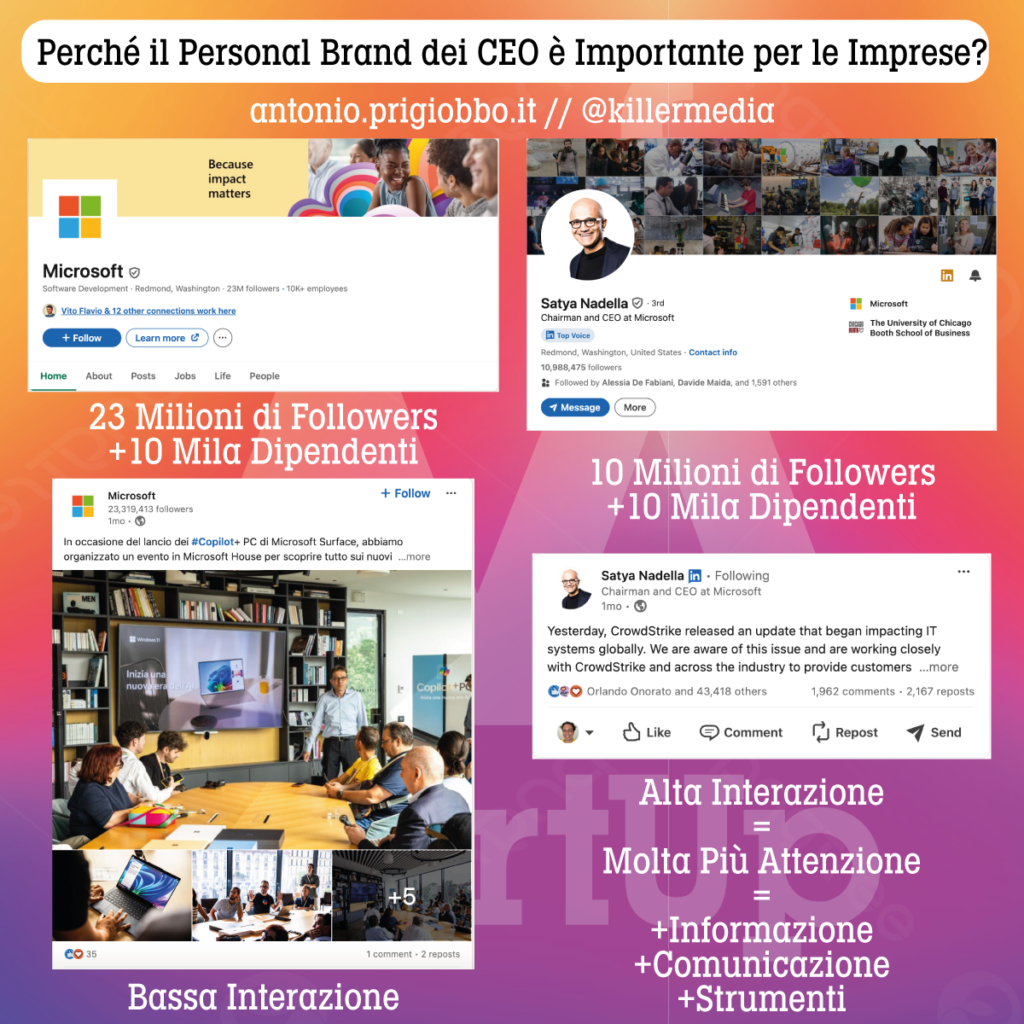[English version follows]
Perché il Personal Branding è Utile per il Successo di un’Impresa?
In un mondo sempre più connesso e dinamico, la comunicazione di un’impresa — sia essa una società commerciale, un’azione coraggiosa, un progetto o un’iniziativa ad alto impatto sociale — non può permettersi di perdere l’opportunità di acquisire voce e forza attraverso chi la guida. Figure fondamentali come CEO, project manager e direttori non solo danno una direzione strategica al progetto, ma costruiscono una narrazione che influenza profondamente la percezione esterna.
La personalità professionale di queste persone è in grado di imprimere al progetto diverse caratteristiche fondamentali:
• Autenticità: Il modo in cui un leader si esprime e si comporta può trasmettere trasparenza e genuinità, rendendo l’impresa più credibile agli occhi di partner e clienti.
• Empatia: Un professionista capace di comprendere e connettersi con gli altri rafforza il senso di comunità e partecipazione, sia all’interno che all’esterno dell’organizzazione.
• Visione: La capacità di ispirare e tracciare un percorso chiaro per il futuro aiuta a motivare i team e a guidare l’impresa verso l’innovazione.
• Affidabilità: Un leader che si dimostra coerente e competente rafforza la fiducia nel progetto, contribuendo a creare solide relazioni con gli stakeholder.
• Creatività: La capacità di affrontare sfide e opportunità con un approccio originale e flessibile distingue l’impresa dalla concorrenza e facilita l’adattamento ai cambiamenti.
In sintesi, la personalità professionale non solo modella il percorso di un’impresa, ma influisce anche sulla percezione e sull’impatto che essa genera nel mercato e nella società.
La Norma
La comunicazione per un’impresa è gestita solo dai vertici (come l’Amministratore Delegato, il CEO, i Responsabili di progetto, ecc.) e dall’ufficio stampa o da un’agenzia specializzata, composta da esperti in Comunicazione, Relazioni Esterne, Media, Pubbliche Relazioni e Marketing.
Il Personal Branding del CEO e dei leader aziendali è essenziale per la comunicazione esterna, ed ecco perché l’Amministratore Delegato (AD) e i responsabili stampa rivestono un ruolo cruciale:
1. Rappresentanza: L’AD rappresenta la leadership e la visione dell’azienda, rendendo le comunicazioni più autorevoli.
2. Coerenza: I responsabili stampa garantiscono che i messaggi siano allineati alla strategia e al brand.
3. Gestione della reputazione: Proteggono l’immagine aziendale, soprattutto in situazioni critiche.
4. Credibilità: La voce dell’AD crea fiducia e rafforza i rapporti con gli stakeholder.
5. Relazioni: I responsabili stampa curano le relazioni con i media e gli opinion leader.
In sintesi, queste figure chiave garantiscono che l’immagine dell’azienda sia coerente, autorevole e credibile.
Un esempio emblematico è quello di Satya Nadella, CEO di Microsoft, capace di catalizzare l’attenzione in modo unico e sempre a vantaggio dell’azienda. Sebbene Nadella abbia meno follower rispetto a Microsoft, è in grado di trasformare la comunicazione da istituzionale a personale, conferendole personalità e creando una viralità diversa: empatica.

Questa dinamica può sembrare controintuitiva, ma si basa su profondi fattori psicologici: le persone si fidano e si connettono più facilmente con altre persone, piuttosto che con entità astratte. Anche se un giorno Satya Nadella dovesse lasciare Microsoft, sia i dipendenti che il pubblico esterno continueranno a cercare, soprattutto sui social, un punto di riferimento personale e un canale privilegiato di comunicazione. Questo evidenzia la complessità e l’importanza di strutturare e mantenere solide relazioni, interne ed esterne all’azienda.
L’importanza della differenziazione comunicativa
È sempre più evidente che un’impresa, grande o piccola che sia, necessiti di una comunicazione differenziata, dove il personal branding gioca un ruolo cruciale. I numeri parlano chiaro: la presenza attiva sui social media oggi è una responsabilità non solo in termini di impatto sociale tradizionale, ma anche per la capacità di costruire relazioni, collaborazioni interne e esterne, fino a occuparsi della crescita del progetto, dei prodotti, dei servizi e perché no attrarre e catalizzare le energie fino alla finanza.
Per questo è essenziale investire nella costruzione di un personal brand maturo e ben delineato. Le persone che guidano, supportano e educano un progetto, devono essere in grado di rappresentarlo e comunicare il valore e la qualità delle iniziative che promuovono.
Cosa è e cosa non è Personal Brand
Una persona decide di fare il follower per seguire una persona, per conoscerne il lato umano, non per rileggere le “solite” notizie aziendali. Vuole scoprire la persona dietro il ruolo, il suo carattere e il suo approccio. Per questo, è fondamentale definire una strategia di comunicazione che varia in base alla tipologia di impresa, all’ambito di riferimento, alla sensibilità e alla complessità del settore, ma soprattutto al carattere e alle capacità comunicative della persona, sia internamente che esternamente all’azienda. È essenziale decidere cosa e come comunicare sui diversi canali, bilanciando aspetti professionali e personali, fino a includere anche il tempo libero.
Ma possiamo incorrere in errori?
La domanda è legittima: il rischio di commettere errori esiste, soprattutto in un mondo social che può confondere. Tuttavia, è meglio iniziare e sperimentare velocemente per avere un megafono e un canale rodato da usare all’occorrenza piuttosto che non averlo affatto. È fondamentale creare canali di comunicazione solidi, costruiti con attenzione e consapevolezza, per ridurre i rischi e massimizzare le opportunità.
Acquaiuo’, l’acqua è fresca?… Manco ‘a neve!
Il Driver (l’Amministratore Delegato, il CEO, il direttore, etc) non deve diventare l’Acquaiolo il dispensatore di quanto si è belli e bravi 😉 Infatti questo proverbio napoletano ci invita a non chiedere (o non ncessariamente a credere) al mercante se la sua merce è buona. Ecco perché se si chiede all’acquafrescaio o a qualsiasi venditore di bibite se le sue bevande sono fresche, è naturale che, per venderle, risponderebbe che sono addirittura più fresche della neve!
Contemporaneità
Oggi, il personal branding non è solo un’opzione, è uno strumento. E il suo corretto utilizzo può fare la differenza tra un progetto che si afferma nel tempo e uno che fatica a trovare la propria voce dall’istituzionalizzazione
In un’epoca dove la fiducia e la connessione personale sono la chiave del successo, investire nel personal branding è una delle strategia d’impresa. Un’impresa cresce quando le persone che la guidano sanno comunicare efficacemente, sia verso l’interno che verso l’esterno.
I social media offrono grandi opportunità, ma devono essere usati con consapevolezza per evitare disfunzioni o crescite non allineate agli obiettivi.
Why is Personal Branding Useful for Business Success?
In an increasingly connected and dynamic world, a company’s communication—whether it’s a commercial entity, a bold initiative, a project, or a high-impact social action—cannot afford to miss the opportunity to gain strength and voice through its leadership. Key figures like CEOs, project managers, and directors not only provide strategic direction to a project but also craft a narrative that profoundly influences external perception.
The professional personality of these leaders can impart several essential characteristics to the project:
• Authenticity: The way a leader expresses themselves can convey transparency and genuineness, making the company more credible in the eyes of partners and clients.
• Empathy: A professional capable of understanding and connecting with others strengthens the sense of community and engagement, both within and outside the organization.
• Vision: The ability to inspire and chart a clear path for the future helps motivate teams and guide the company toward innovation.
• Reliability: A leader who demonstrates consistency and competence reinforces trust in the project, helping to build solid relationships with stakeholders.
• Creativity: The ability to tackle challenges and opportunities with a flexible, original approach sets the company apart from competitors and facilitates adaptation to changes.
In summary, a professional personality not only shapes the course of a business but also affects how it is perceived and the impact it generates in the market and society.
The Standard
Typically, communication for a business is handled only by its leaders (such as the CEO, Project Managers, etc.) and the press office or a specialized agency, consisting of experts in Communications, Public Relations, Media, and Marketing.
The Personal Branding of the CEO and business leaders is crucial for external communication, and this is why the CEO and press officers play a critical role:
1. Representation: The CEO represents the company’s leadership and vision, lending authority to communications.
2. Consistency: Press officers ensure messages align with the company’s strategy and brand.
3. Reputation Management: They safeguard the company’s image, especially in critical situations.
4. Credibility: The CEO’s voice creates trust and strengthens relationships with stakeholders.
5. Relationships: Press officers carefully manage relations with media and opinion leaders.
In summary, these key figures ensure that the company’s image remains consistent, authoritative, and credible.
An Example: Satya Nadella
A striking example is Satya Nadella, CEO of Microsoft, who manages to capture attention in a unique way, always to the company’s advantage. Even though Nadella has fewer followers than Microsoft, he transforms communication from institutional to personal, adding personality and creating a different kind of virality: an empathetic one.
This dynamic may seem counterintuitive, but it’s rooted in deep psychological factors: people trust and connect more easily with other people rather than abstract entities. Even if one day Satya Nadella were to leave Microsoft, both internal employees and external audiences would still seek, especially on social media, a personal point of reference and a privileged communication channel. This highlights the complexity and importance of structuring and maintaining solid relationships, both within and outside the company.
The Importance of Differentiated Communication
It is increasingly evident that businesses, large or small, need differentiated communication, where personal branding plays a crucial role. The numbers are clear: having an active presence on social media today is not only a responsibility in terms of traditional social impact but also essential for building relationships and collaborations, growing the project, products, and services, and even attracting and channeling financial energy.
For this reason, it is essential to invest in the development of a mature and well-defined personal brand. The people who lead, support, and educate a project must be able to represent it and communicate the value and quality of the initiatives they promote.
What Personal Branding Is and What It Is Not
People choose to follow someone to connect with their human side, not to reread the “usual” company news. They want to discover the person behind the role, their character, and approach. This is why it’s crucial to define a communication strategy that varies based on the type of company, its field, sensitivity, and complexity, but above all the personality and communication skills of the individual, both within and outside the company. It’s important to decide what and how to communicate on different channels, balancing professional and personal aspects, even including free time.
But Can We Make Mistakes?
The question is legitimate: the risk of making mistakes is real, especially in a social world that can be confusing. However, it’s better to start experimenting quickly to have a well-established megaphone and channel to use when needed, rather than having none at all. It’s crucial to create solid communication channels, built with care and awareness, to reduce risks and maximize opportunities.
“Don’t ask the barber if you need a haircut!”
The Driver (the CEO, Director, etc.) shouldn’t become the “barber” who constantly praises how great and capable they are 😉 This English proverb reminds us not to ask (or not necessarily believe) those who have a vested interest in promoting their goods whether they are really of good quality. That’s why, if you ask a seller if their product is the best, it’s natural that, to convince and sell, they would respond that it’s even better than you could imagine!
Contemporaneity
Today, personal branding is not just an option; it is a tool. And its proper use can make the difference between a project that establishes itself over time and one that struggles to find its voice in an institutionalized world.
In an era where trust and personal connection are key to success, investing in personal branding is one of the essential business strategies. A company grows when its leaders know how to communicate effectively, both internally and externally.
Social media offers great opportunities but must be used with awareness to avoid dysfunctions or growth that isn’t aligned with the company’s objectives.
Let me know if you’d like any adjustments!


